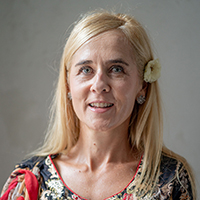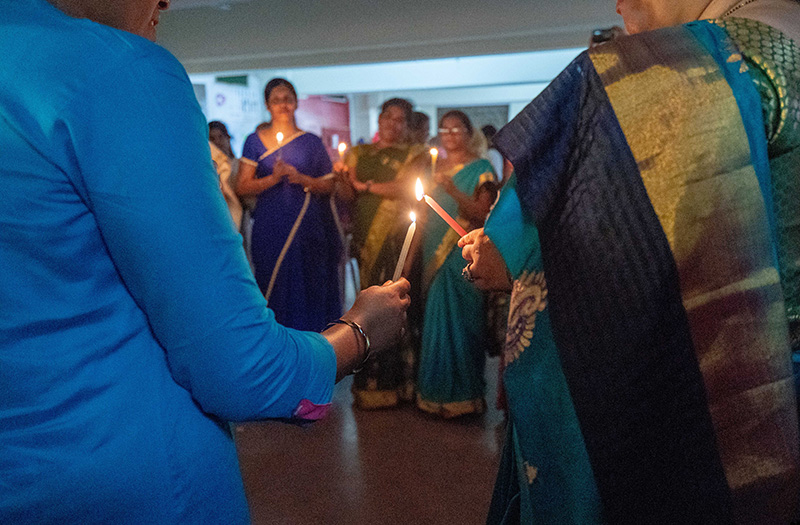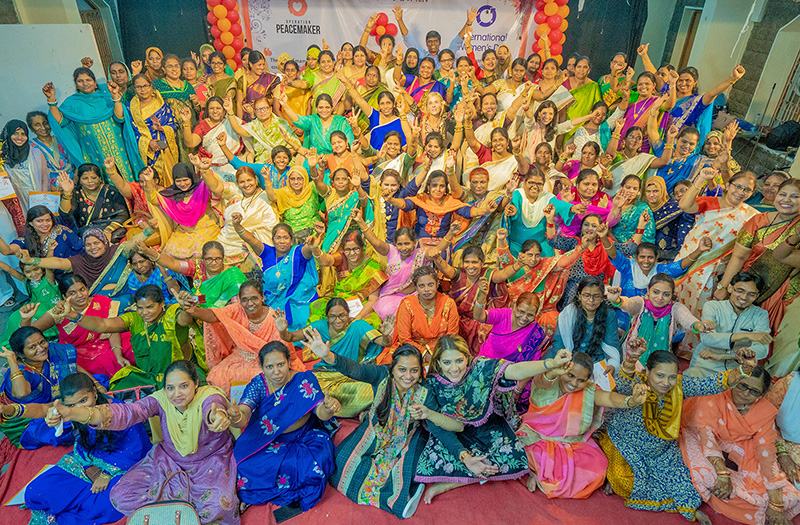My Choices: Building Strong Women and Good Fathers
Providing small loans to women is often the solution that allows families to lift themselves out of poverty. But what happens when those women—a staggering 50 per cent of women in India—are suffering abuse at the hands of their husbands?
Elca Grobler, founder of Opportunity International Australia's partner My Choices Foundation, journeyed to India to help women leave poverty behind through microfinance. What she saw changed the way she thought about ending poverty.
Elca shared with us how the work of My Choices is helping make communities safer for women and children.
You initially went to India to start a microfinance institution. What prompted you to found My Choices instead?
My educational and professional background is in finance and banking, and I also worked for three years at Opportunity International Australia in the area of microfinance. When my family and I moved to India, my hope was to get involved in an organisation that focused on microfinance. But after meeting many women over six months, I realised that in India, more than 40 per cent of women face domestic violence and two out of three women who face this abuse will never seek help. We can talk about (and teach) financial literacy or empowerment, but if the husband takes away the money or if the women get beaten up every night and abused, that is where they need help and where they need support, guidance and assistance.
So our focus shifted and My Choices Foundation, which focuses on domestic violence, was founded.
Are there patterns to domestic violence and trafficking or do they affect all walks of life?
Gender-based violence affects all of us, and domestic violence and human trafficking shows no respect to age, religion, caste, past or income, geographical area, or demographic. Domestic violence occurs anywhere and everywhere; nobody is safe, protected or excluded from it. At one of the recent UN summits, it was declared that gender-based violence is one of the most pressing human rights issues that our generation faces.
As mentioned before, more than 40 per cent of women in India face domestic violence and abuse. We have the challenge that close to 40 per cent of the world's child marriages also occur in India. The moment a minor gets married, the probability of her being a victim of violence and abuse will rise to as much as 80 per cent.
Trafficking in India is widely spread. Every three minutes a girl in India gets trafficked or deceived into sexual slavery. The average age of these girls is now already under the age of 12 years and girls are trafficked from all states of India.
Only one per cent of these girls will ever be rescued. Due to their age and vulnerability, many of the girls cannot speak up for themselves and will inevitably, never speak up because they do not know where to go for help. That is one of the biggest aspects we focus on, to shine a light on not only what is happening, but providing the tools for the women and girls to find help and seek justice.
My Choices Foundation is made up of two separate entities: Operation PeaceMaker and Operation Red Alert. What is unique about these programs?
Operation PeaceMaker and Operation Red Alert are two distinct programs of My Choices Foundation. Operation PeaceMaker focuses on domestic violence and we work through local women who are trained to become the change-agents in their communities. They are trained to understand domestic violence, how to identify domestic violence and gain trust to help women and girls who are facing domestic violence and abuse, to bring them to our various counselling centres, where they receive counselling and guidance and appropriate tools. Operation PeaceMaker provides victims with access to legal rights and protection, and access to our safe home—The Lotus Safe Home. We also do a lot of prevention work in schools, colleges and outreach programs. To date, 100,000 girls and women have been reached since the inception of the program and through these outreach programs, we have handled over 8,000 cases in our counselling centres.
Operation RedAlert is the other distinct program and its main focus is the prevention of sex trafficking. Geographically this is also a different outreach. Since girls are mostly being trafficked from villages, we have to go into the villages, where we train the mothers, fathers, teachers, boys, and girls on how to recognise and identify how traffickers operate and how to keep themselves safe in these circumstances.
1,476,074 people in 2,699 vulnerable villages have now received training and tools to prevent human trafficking.
– Opportunity International Australia
What is the biggest challenge faced by women and children in India regarding domestic violence and trafficking?
The biggest challenge is that domestic violence is a common occurrence in India. A recent study conducted by the National Health Bureau of India, stipulated that close to 54 per cent of men and women stated that a man is justified in beating his wife as a form of discipline. This shows us that both men and women grow up with the belief that it is acceptable to abuse a woman.
It is very difficult for women to find an avenue for speaking up because there aren’t that many places for them to seek help. As mentioned, two out of three women will never seek help. They do not know where to find help and there is the shame that they think they will bring upon their families once they have spoken out.
Meanwhile, a boy growing up in a home where domestic violence transpires is five times more likely to perpetuate that same violence once he is an adult.
There is no magic wand for gender-based violence, if there was, we would have waved it.
With regards to trafficking, it is the level of ignorance that is our biggest challenge. In the states where we work, parents are tricked into letting their girls go out of the villages by a ‘lie’ that they will be offered a better education or a better job. They do not let their girls go on the basis of selling them, but on a false pretense that is told to them.
Someone ‘new’ will come to the village, spend time in the village and get to know the family, and the families grow comfortable and trustworthy towards this individual. After some time, there will be promises made to the families for assuring a better life for their daughters, outside the villages in the cities, with the promise of prosperity, in the form of schooling or a job.
You’ve spoken about building an army of good fathers. How will this help?
In Indian society, the father play a very important role in the family as decision-maker and protector. We recently commissioned research with Final Mile Consulting, behavioural architects that are based in Mumbai, on how can we speak to the fathers in the village and how we can really get into the hearts of the fathers to motivate and educate them to protect their daughters from traffickers. The message is a positive message, speaking about the good in the father, how he will protect his girls, same as protecting his crop – by giving water, protecting the crop from the sun, not harvesting the crop too early – using this as an analogy for their daughters. This message is built into a comic book and flyers. Our message is that we want to build an army of good fathers in all the villages of India to become the protectors of their families.
What is the biggest challenge that you and the My Choices Foundation face?
I think on a macro level, some days the magnitude of the problem is overwhelming. The frequency and the severity of gender-based violence is not something that we will be able to stop in our generation, even though there are so many amazing credible organisations working on this. The issue is so prevalent that on some days it feels like we are not evening making a dent. Although we know that what we are doing is intergenerational and we know that change takes time by slowly building momentum. And the amount of girls being trafficked and knowing that only one per cent will ever be rescued is a very harsh reality.
When you take the macro level to a micro level and on an individual level – for the team it means that most days we deal and work with a lot of people’s pain and grieving, loneliness, fear, and abuse. It is hard to not get affected by it. We have a term that we refer to as a team—'Dragon Slayer'—this is a metaphor for the people that go out there every day, slaying dragons in the field. They are the strongest people you will ever meet, with the most caring attitude, because of the stories and lives that they impact and that they deal with every day.
What has surprised you since starting My Choices Foundation?
There have been many, many surprises but I think of it as an inspiration, rather than a surprise. The resilience of the women and girls we work with and the courage that the women and the girls portray, who come from extremely abusive homes, is a true inspiration.
When someone shares their story at one of our centres for the first time, it is inspirational. It is inspirational how they have had the resilience to live through this all these years for the safety of their children. Moreover, it moves us how they have the courage to start speaking and standing up to the abuse, once they have received the tools to cope.
Most of these women do not have a choice. They have to go back to their homes for the sake of the children and that displays true courage. The spirit of the human soul that does not give up can be reflected in the schoolgirls’ absolute commitment and courage to look after one another and not make the same mistake that their mothers made. In most cases, this is not the mistake of the mothers, since they were born in this situation. But to think about a girl who dreams of a better life and is willing to learn and sit by candlelight only to have a better future and be educated – this is inspirational.
The courage of a 14 year old that phones the helpline, stating that her parent is forcing her into a child marriage, and can we please help her. It is this type of courage, resilience and beauty of these girls that keeps us going and inspires us and that make us get up every morning to stand up for them, when they can’t do it themselves.
What is the aim of the conference you are holding in July?
The aim is to end large-scale sex trafficking by 2025. Although this is a rather daunting task, there is only one way to achieve it – by building a working coalition. Our aim is to actively collaborate with other NGOs to strengthen our collective work, spread awareness, and jointly maximise our impact and reach.
There is a saying: "A chain is only as strong as its weakest link". Our aim is to ensure that the entire chain of stakeholders fighting against trafficking is strong and geared up to fight traffickers to the best of their abilities.
What is the link between My Choices and Opportunity International Australia?
Opportunity International is one of the funding partners of My Choices Foundation. They have raised funds for us and they have also worked with the Australian Government to vet us as a partner to receive Australian Aid Funding. They have also worked with other organisations in Australia to obtain other funding for us. We are on a journey as much as we are in a partnership with Opportunity.
If there was one thing you could get across to men, women or children in India, what would it be?
My message would be the value of each human being: equal value in male and female, equal value in boy and girl, equal value in religion, equal value in caste. We are all made equal and if we can respect and treat each other as equal, then so much of this abuse and violence and anger will disappear. When we can create equality for both genders, we will have a much better world. Because in the end, women hold up half the sky.
Opportunity International Australia supports the work of the My Choices Foundation as part of its Safety program, with support from the Australian Government (ANCP).
 Elca Grobler is the founder of My Choices Foundation,
Elca Grobler is the founder of My Choices Foundation,
an organisation dedicated to ending domestic
violence and human trafficking.

